|
|
|
Sort Order |
|
|
|
Items / Page
|
|
|
|
|
|
|
| Srl | Item |
| 1 |
ID:
190422
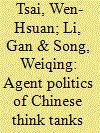

|
|
|
|
|
| Summary/Abstract |
This paper analyzes the relationship between the Chinese government and domestic think tanks. Chinese think tanks in the cultural sector have a strong demand-side orientation; that is, they closely follow the instructions of the Chinese Communist Party (CCP) in their stand on culture-related policies. Since 2018, the CCP has strengthened its control over the propaganda and cultural affairs, using think tanks to this end. Think tanks act as dual agents, maximizing the benefits offered by their two principals – the party government and private businesses, while prioritizing the former. The paper examines the development of the Putuo Island Park in Zhejiang Province and the Cultural Industry Research Institute, the key cultural industry think tank in this province. While upholding Xi Jinping’s aspiration of developing China into a “cultural great power,” cultural think tanks’ main function is to endorse government policies and guide businesses to support those policies when necessary. The CCP under Xi has intensified its manipulation of think tanks to reinforce its control over ideology and the socialist market economy, resulting in a more complex relationship between the state and think tanks.
|
|
|
|
|
|
|
|
|
|
|
|
|
|
|
|
| 2 |
ID:
163763
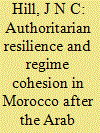

|
|
|
|
|
| Summary/Abstract |
This article argues that Morocco's competitive authoritarian regime is more resilient today in certain key respects than it was when the Arab Spring began. Drawing on Levitsky and Way's dimension of organisational power, the article contends the regime was sufficiently unnerved by the unrest to resort to the use of high intensity coercion as part of its response to the 20 February Movement. The article maintains that, in employing this force successfully, the regime has turned the protests into an important source of non-material cohesion for its security apparatus and thereby enhanced its ability to defend itself from similar challenges in the future.
|
|
|
|
|
|
|
|
|
|
|
|
|
|
|
|
| 3 |
ID:
175945
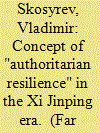

|
|
|
|
|
| Summary/Abstract |
This article deals with works by some Western Sinologists about China in the era of Xi Jinping. The Western media and academic community have collected a large amount of factual material about modern China, including China in the "Xi Jinping era." However, Western academic science has not created a research paradigm that would comprehensively explain the system of Chinese socialism. In the author's opinion, the basic concept of "authoritarian resilience" is, to a certain extent, contradictory in itself.
|
|
|
|
|
|
|
|
|
|
|
|
|
|
|
|
| 4 |
ID:
169790
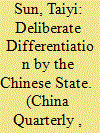

|
|
|
|
|
| Summary/Abstract |
Do authoritarian governments’ responses towards different civil society organizations (CSOs) reflect policy differentiations? Building on the existing literature of graduated control, diversification of civil society, and consultative authoritarianism, this paper utilizes an online field experiment,1 and interviews with government officials and CSO leaders to demonstrate that local governments have the tendencies to intentionally treat different CSOs with different policy responses, referred to as “deliberate differentiation” in this paper. However, contrary to what the existing literature would suggest, this study reveals that at the local level, such differentiation is driven more by the state's interest in extracting productivity and outsourcing responsibility for the provision of public goods and less by the state's need to acquire information from CSOs, including politically sensitive advocacy groups.
|
|
|
|
|
|
|
|
|
|
|
|
|
|
|
|
| 5 |
ID:
185622
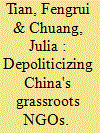

|
|
|
|
|
| Summary/Abstract |
This article employs ethnographic fieldwork and interviews to examine two distinct processes of depoliticization by non-governmental organizations advocating rights for sex workers in China. Drawing upon Bourdieu and institutional theory, we argue that the consolidation of state repression of civil society under the Xi regime created an institutional field of power to which two NGOs responded differently. While one of them relied on government procurement as its major funding source, thus diluting the original mission, the other internalized state rhetoric as it sought political legitimacy through state certification, thus sanitizing its political mission. These distinct responses were then institutionalized into organizational practices, norms and culture. Rather than portraying NGOs in China as either capable political actors or pawns of an authoritarian state, this article illustrates how NGOs are subtly depoliticized by being inculcated in a state-produced, hierarchical social order in which compliance with state norms becomes synonymous with organizational competence.
|
|
|
|
|
|
|
|
|
|
|
|
|
|
|
|
| 6 |
ID:
181915
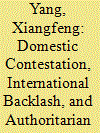

|
|
|
|
|
| Summary/Abstract |
This article aims to provide a first-cut analysis of the causes of the initial COVID-19 outbreak as well as the subsequent political contestations in which the masses ended up rallying behind the party-state. While the Wuhan fiasco had everything to do with entrenched pathologies of the bureaucratic state, after Beijing took central command of the broader campaign its overriding priority was to contain the virus with a goal toward salvaging its legitimacy at home. To that end, Beijing unleashed its warrior diplomats to aggressively defend its handling of the pandemic, even to the detriment of its international image. Nevertheless, the strategy worked because the nationalist and populist backlash against the regime’s foreign and domestic critics helped turn the public opinion around in its favor.
|
|
|
|
|
|
|
|
|
|
|
|
|
|
|
|
| 7 |
ID:
156520
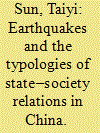

|
|
|
|
|
| Summary/Abstract |
The proliferation of civil society organizations after the 2008 Wenchuan earthquake and the 2013 Lushan earthquake in China has caught the attention of scholars in Chinese politics and disaster politics. Immediately after the earthquakes and during the recovery period, civil society organizations were given a rare opportunity to work closely and intensely with the state. As a result, these organizations adjusted their behaviour – sometimes compromising with the state on many fronts – in exchange for better relations with the state and in order to achieve their goals, but they had to work in new and creative ways. Drawing on evidence from a dozen case studies and 61 in-depth interviews with government officials and leaders of civil society organizations in Sichuan Province, this article argues that we can map the state’s preferences and policy distinctions through its varied responses to these organizations during an earthquake recovery period. Specifically, whether the state is more effective in delivering public goods and services in a given area and whether the goals of civil society organizations align with those of state are two key determinants of relations between the state and civil society organizations. This article proposes a comprehensive typology of such relations in China: complementary, cooperative, competitive and confrontational. These categories are not static, because the government and civil society organizations adjust their policies and behaviour as they interact. These learning experiences, triggered by the earthquakes, create a dynamic process of evolving state–society relations in China today.
|
|
|
|
|
|
|
|
|
|
|
|
|
|
|
|
| 8 |
ID:
167849
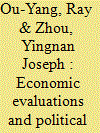

|
|
|
|
|
| Summary/Abstract |
The economic voting literature argues that economics matters to democratic leaders. We argue that it matters to authoritarian leaders, too, and its influence is stronger there than it is in democratic countries. Using data on four Asian countries from the Asian Barometer Survey, we find substantial support for our theory.
|
|
|
|
|
|
|
|
|
|
|
|
|
|
|
|
| 9 |
ID:
178173
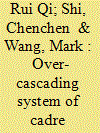

|
|
|
|
|
| Summary/Abstract |
China’s cadre evaluation system – the personnel management system used to assess the performance of government officials in the party-state – is considered an important tool for upper-level governments to supervise and regulate lower-level agents. This system is one of the key factors contributing to the Chinese Communist Party’s (CCP) authoritarian resilience. Deficiencies of this system are exemplified by the ‘blind pursuit of GDP’, selective implementation, gaming, collusion, and data fabrication. The CCP has been reforming this system to strengthen its monitoring and political control over local government cadres, especially at the county level, and it is a crucial component in the step-by-step hierarchical power structure. While current literature focuses largely on the assessment content of such reform, this article pays specific attention to the changes in the cascading evaluation structure of province to prefecture to county. The article identifies a new dynamic of ‘over-cascading’ whereby provincial governments bypass prefectural governments and directly evaluate county officials, resulting in the co-existence of prefecture-county and province-county evaluations. This article also explores the functioning mechanism of this dual structure and argues that this structural change in the cadre evaluation system is breaking the traditional hierarchical governance structure and enhancing authoritarian resilience of the CCP because it provides a new route for over-cascading governance between provincial and county governments. This research contributes to the conceptualization of the over-cascading governing structure of the CCP and fills gaps in the literature on structural changes in China’s cadre evaluation system.
|
|
|
|
|
|
|
|
|
|
|
|
|
|
|
|
| 10 |
ID:
144540
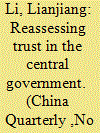

|
|
|
|
|
| Summary/Abstract |
This paper argues that popular trust in the Chinese central government is significantly weaker than five national surveys suggest. The evidence comes from these surveys. First, the surveys show that between one- and two-thirds of respondents hold hierarchical trust, i.e. they have more trust in the central government than they do in local government. Second, all other things being equal, people who are less satisfied with political democracy in China tend to be less trusting of the central government. Finally, hierarchical trust holders tend to be less satisfied with political democracy in the country than those who express equal trust for central and local governments. Put together, the three findings show that hierarchical trust holders are less trusting of the central government than equal trust holders with regard to developing political democracy, although they sound equally confident. The fact that so many respondents hold hierarchical trust indicates that trust in the central government is significantly weaker than it looks.
|
|
|
|
|
|
|
|
|
|
|
|
|
|
|
|
| 11 |
ID:
179297
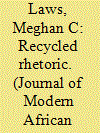

|
|
|
|
|
| Summary/Abstract |
Seen as one of Africa's most visionary and enlightened autocrats, Paul Kagame's presidency is often contrasted with the violence and ethnocentrism of his discredited predecessors. Drawing on rarely analysed primary sources, this article disputes this simplified narrative by revealing striking continuities in the ruling elite's rhetorical repertoire in the late colonial period (1956–1959) and present-day Rwanda. Both then and now, rhetorical calls to remove ethnic labels from public discourse in the name of national unity are key resilience strategies designed to shape regime relations with domestic and international audiences in ways that reinforce power concentration by a small (largely Tutsi) elite. Changes in the distribution of power and the scale of anti-Tutsi violence (most notably in 1994) help explain why a similar rhetorical strategy failed to prevent the dismantling of the Tutsi oligarchy in 1961 while strengthening its contemporary counterpart.
|
|
|
|
|
|
|
|
|
|
|
|
|
|
|
|
| 12 |
ID:
133221
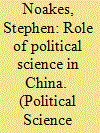

|
|
|
|
|
| Publication |
2014.
|
| Summary/Abstract |
INTELLECTUALS HAVE HISTORICALLY BEEN AMONG the foremost advocates of political reform in repressive autocratic states. During the early decades of the twentieth century, scholars and writers served as chief witnesses to the atrocities arising from events such as the Spanish Civil War, Nazism, and the Stalinist purges. Later, they formed the basis of the samizdat movement that played an integral part in the destruction of European communism.1 Indeed, the leftist intelligentsia of the former USSR and its satellites became some of those regimes' most ardent critics and the instigators of revolutionary political change.2 More recently, intellectuals have led calls for liberalization in the Color Revolutions of central and southern Europe, as well as sub-Saharan Africa and the Middle East, in some cases even transitioning from academic life into new roles as politicians.3 The late Václav Havel in Czechoslovakia and Kosovo's Ibrahim Rugova are just two of the most ready examples.
|
|
|
|
|
|
|
|
|
|
|
|
|
|
|
|
| 13 |
ID:
153400
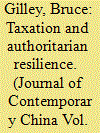

|
|
|
|
|
| Summary/Abstract |
Taxation provides important inferences about the nature of non-oil authoritarian regimes. This article looks at taxation to understand the ruling Chinese Communist Party’s relationship to society. It finds that the party has maintained fiscal capacity through non-intrusive transactional taxes that allow it to deliver more services in wealthier areas where potential dissent is greatest. This model is reaching its limits because of its negative impacts on economic growth and social equity. Attempts to expand new taxation sources—such as property value taxes or progressive and comprehensive personal income taxes—are difficult because of the prior reliance on transactional taxes. As a result, the CCP will rationally continue to rely on inefficient and inequitable taxation because of the political costs of pursuing a modern taxation system. The China case is indicative of the fiscal dynamics of durable authoritarian regimes.
|
|
|
|
|
|
|
|
|
|
|
|
|
|
|
|
| 14 |
ID:
153350
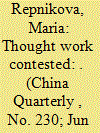

|
|
|
|
|
| Summary/Abstract |
This article examines the dynamic evolution of China's ideology work through the prism of journalism education. Official sensitivity about both student activism and the media makes journalism education a critical sector for observing how the Party attempts to instil ideology. The article interrogates the process of negotiation of official ideology among authorities, educators and students at elite journalism schools. It demonstrates that alongside state-sanctioned media commercialization and globalization, official influence still looms large in journalism training. Ideological teachings continue to occupy a core place in the curricula, and the authorities deploy a mix of structural oversight, ad hoc surveillance and coercion to keep the educators in check. The effects of the official ideology work, however, are ambivalent, as educators and students engage in the active reinterpretation of the Party's media principles. While these practices do not directly undermine the Party's legitimacy, they demonstrate that official ideology has merely constructed what Yurchak terms a “hegemony of form,” highlighting a degree of vulnerability in China's mode of adaptive authoritarianism.
|
|
|
|
|
|
|
|
|
|
|
|
|
|
|
|
| 15 |
ID:
142568
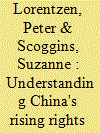

|
|
|
|
|
| Summary/Abstract |
Claims that China's people are exhibiting a rising “rights consciousness” have become commonplace, with some suggesting this phenomenon is driving political change. Yet it is often unclear what the concept means, leading to ambiguous or contradictory conclusions from field research. In order to create a basis for more systematic analysis, we develop a rational choice framework that characterizes three different factors that could lead to rights-conscious behaviour: changing values, changing government policies, and changing expectations of the behaviour of others. What rising rights consciousness implies for social stability can vary dramatically, depending on which change is at work. Rights consciousness resulting from changes in values or in shared expectations of behaviour is destabilizing for the CCP's continued rule, whereas rights consciousness derived from government policies has a stabilizing effect. While in practice these can be interrelated in complex ways, empirical research would benefit from greater attention to these distinctions.
|
|
|
|
|
|
|
|
|
|
|
|
|
|
|
|
|
|
|
|
|